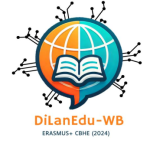Tekući projekti
Univerzitet Mediteran učestvuje u sljedećim
tekućim projektima:
DiLanEdu-WB
Digital Transformation in Language Study and Education in the WB
ERASMUS+ CBHE (2024) Project No. 101179642
link
In the Digital Age, as children spend increasingly more time in the digital world at the expense of time spent in physical interaction with other children, digitalization of language instruction is imperative to improve oral communication, language skills and reduce anxiety in speaking tasks. The necessity to integrate digital methods and tools in language education and study has been identified in the West Balkans, where strategies have been developed for digital transformation setting digital competencies as a primary aim in the transformation of their educational systems. Common issues identified therein include the inadequate qualification of teachers, including language teachers, to integrate digital tools and methods in the teaching and learning process, as well as the absence of adequate digital content in WB languages.
Hereupon, this project aims to improve the quality of language education in the WB Higher Education Area by strenthening the participating HEI language teacher-training curricula with ICTs. The project will also establish and operationalize specialized laboratories. The particular objectives of the project are as follows:
- The updating and enhancing existing curricula to incorporate digital methods and tools in language teaching, learning and research in new & innovative transformations of older disciplines (e.g., computational linguistics) and the development of new micro credentials training programmes for pre-university education teachers in the same discipline.
- The establishment or enhancement of specialized laboratories of digital methods and tools in language teaching, learning and research.
- The establishment of a network of institutions and individuals sharing similar interests in using and promoting digital tools in language teaching and learning, as well as in linguistic scientific research.
The project will thus develop capacities in the following three directions:
- Digital Language Education.
- Instruction of language skills and intercultural skills in a digital environment.
- Digital transformation in discourse and linguistic analysis.
Project Partners
- Logos University College, Albania, Coordinator.
- University of Tirana, Albania, Partner.
- "Eqrem Çabej" University of Gjirokastrër, Albania, Partner.
- University of Banja Luka, Bosnia & Herzegovina, Partner.
- University of Sarajevo, Bosnia & Herzegovina, Partner
- University of Prishtina, Kosovo, Partner.
- “Isa Boletini” University of Mitrovica, Kosov, Partner.
- Mediterranean University of Podgorica, Montenegro Partner.
- University of Western Macedonia, Greece, Partner.
- OTTO-VON-GUERICKE University of Magdeburg, Germany, Partner.
- British School of Tirana, Albania, associated partner.
- Faik Konica School, Kosovo, associated partner.
- “Trol” Nursery School, Bosnia & Herzegovina, associated partner.
- “Miloje Dobrasinovic” High School, Montenegro, associated partner.
- TESSERA Information Systems Ltd., Greece, associated partner.
Project Duration: 36 months.

CSupMNE
Straightening Up Cybersecurity Posture of Montenegrin Higher Education system
Erasmus+ projekat CSupMNE je osmišljen da sprovede održive sistemske i strukturne reforme i modernizaciju sistema visokog obrazovanja Crne Gore (MNE), usmerene na procjenu, zaštitu i upravljanje sve većim poslovnim rizicima i prijetnjama u digitalnom svijetu. Projekat će pomoći u zaštiti osoblja, studenata i partnera tokom njihovog boravka u institucijama visokog obrazovanja.
Podciljevi projekta:
- Povećanje svijesti o sajber prijetnjama i izgradnja kapaciteta na svim nivoima sistema visokog obrazovanja.
- Unapređenje kvaliteta obrazovanja kroz usvajanje akreditacionih standarda za digitalno obrazovanje i modernizaciju programa u oblasti sajber bezbednosti.
- Reforma operativnog modela visokog obrazovanja na nacionalnom nivou kako bi se proaktivno identifikovali i rešavali poslovni rizici od sajber pretnji, kroz uvođenje okvira sajber bezbednosti.
- Značajne promjene u infrastrukturi visokog obrazovanja kroz inovativna tehnološka rješenja za smanjenje broja i ograničenje efekata sajber napada.
- Izgradnja kapaciteta i mehanizama za odgovarajući odgovor i oporavak od sajber incidenata kroz uspostavljanje MNE akademskog CSIRT-a.
Ključni pokazatelji: 1 MNE akademski CSIRT, 4 CS grupe sa 55 obučenih članova, 5 modula obuke, 16 trening događaja za rukovodstvo, akademsko i neakademsko osoblje, i 5200 studenata.
Predviđeno je da projekat traje 3 godine, od početka 2025.do kraja 2027.godine.
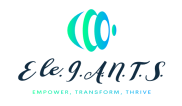
ELEGANTS
E-Learning Gamified and Networked Training for Startupper
The general goal of the project is to increase the innovation capacity of students trained in higher education institutions in the field of culture and art, in the design and implementation of sustainable enterprises and circular economy through the improvement of teaching skills, strengthening of digital, green and entrepreneurial skills. To face the challenges related to the lack of skills in digital methods and their use, the project will therefore develop curricula and training programs of higher education institutions in the field of arts and culture, adapting them to target groups on issues that aim to create new forms of expression and enjoyment of arts and culture and their translation into business opportunities. All this in accordance with the implementation of European strategic cooperation in the field of education and training, enabling the involved higher education institutions to increase the quality and relevance of their activities, to develop and strengthen their partner networks, to increase their capacity to work together at the transnational level, favoring the internationalization of activities, exchange and the development of new practices and methods, as well as the exchange and comparison of ideas.

DIGITCRESHE
DIGITAL TRANSFORMATION IN EDUCATION FOR THE CULTURAL AND CREATIVE INDUSTRIES
The focus of the project corresponds to the call and priorities of the region related to digital transformation, namely developing and implementing digital education strategies, strengthening programs that cover digital skills, assisting in teacher training and online educational learning while making digital transformation as comprehensive and inclusive as possible. In this way, the project also addresses the Green Deal priority of increasing the competitiveness of the region and stimulating green jobs by guaranteeing that students are equipped and prepared for the labor market and society of tomorrow. Therefore, the response to the priority Sustainable growth and jobs by solving the challenges associated with the skills mismatch between education outcomes and labor market requirements. The project closely addresses the following objectives:
- Transferring their teaching and research results to the community/country.
- Increased participation of higher education institutions located in remote areas.
- Regional integration and establishment of comparable tools to support academic cooperation, mobility of students, staff and researchers.
- Stronger connection and cooperation with the private sector, promoting innovation and entrepreneurship.
- Aligning the academic world with the labor market, increasing the employability of students.
- Increased level of digital competence for students and staff.
- Institutional ownership of CBHE results in ensuring sustainability.
- State ownership through experimentation and introduction of positive and best practices in higher education.

IOT-ECO
IOT GREEN TRANSFORMATION FOR ACADEMIC SOCIETY AND BUSINESS ORIENTED ECOSYSTEM IN WESTERN BALKANS
IoT-ECO focuses on building capacity, fostering innovation and facilitating regional cooperation. Our vision is to create an innovative ecosystem within each VZ of the SB, using IoT/IoE solutions to address the specific needs of sectors such as agriculture, tourism and energy. The project extends beyond academia, including associated partners — an innovation fund, a port and an ICT company — to model a business-oriented innovation ecosystem.
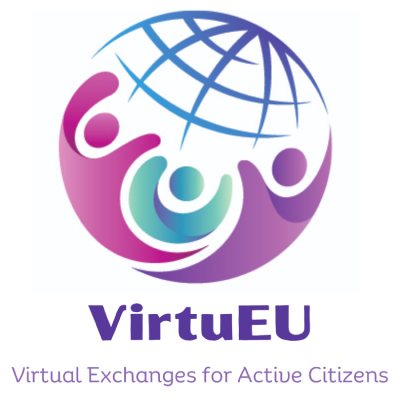
VirtuEU
IOT GREEN TRANSFORMATION FOR ACADEMIC SOCIETY AND BUSINESS ORIENTED ECOSYSTEM IN WESTERN BALKANS
VirtuEu is a virtual exchange program that unites young people across borders, ensuring inclusivity by overcoming barriers that could hinder participation. It aims to engage over 2,500 students of higher education institutions (HEIs) from EU member states and Western Balkan countries in activities that will promote active citizenship and civic participation. We believe that by working together, sharing insights and learning from each other, we can achieve greater impact than any of us could alone. Our project is built on a foundation of mutual respect, open communication and a shared commitment to empowering the target group and increasing their civic participation.

CRED4TEACH
MOOC-BASED MICRO-CREDENTIALS FOR TEACHER PROFESSIONAL DEVELOPMENT
The CRED4TEACH project responds to the needs of higher education institutions and educational decision makers in target countries Albania, Montenegro and Ukraine towards providing high-quality, responsive, inclusive, flexible and competence-based training provisions to in-service teachers across the educational sectors. The project’s solution is to establish the MOOC-based micro-credentials for enhancing the opportunities for teacher professional development in target countries.
The project objectives are:
- to boost staff skills for the development and delivery of MOOC-based Micro-credentials;
- to develop and introduce national and institutional frameworks for the delivery, issuing and recognition of Micro-credentials,
- to create, deliver and validate 11 pilot MOOC-based Micro-credentials,
- to encourage the wider adoption of Micro-credentials for professional development of teachers and other target groups.
To achieve the project objectives, CRED4TEACH partnership will:
- upskill teaching and administrative staff from participating partner institutions to MOOC (Massive Open Online Courses) and micro-credential designers;
- create national and institutional guidelines for offering and validating micro-credentials,
- design, deliver and validate 11 pilot micro-credentials using MOOC approach
- promote the achieved results through a large-scale dissemination campaign.
The expected results of the project are:
- 46 teaching and administrative staff members upskilled to micro-credentials and MOOC-designers;
- 11 MOOC-based micro-credentials, each between 4-6 ECTS, delivered to at least 220 pilot teachers from Albania, Montenegro and Ukraine;
- 3 national and 8 institutional frameworks on the provision and recognition of micro-credentials for teachers;
- 3 national blueprints on adoption of micro-credentials.
CRED4TEACH partnership covers 15 institutions from 7 countries, which are Albania, Estonia, Germany, Montenegro, Portugal, Türkiye, and Ukraine:
- Fachhochschule des Mittelstandes (Bielefeld, Germany)
- Universidade Aberta (Lisboa, Portugal)
- Tallinn University (Tallinn, Estonia)
- Anadolu University (Eskisehir, Türkiye)
- Ukrainian Engineering Pedagogics Academy (Kharkiv, Ukraine)
- Cherkasy State Technological University (Cherkasy, Ukraine)
- Bogdan Khmelnitsky Melitopol State Pedagogical University (Melitopol, Ukraine)
- Drohobych Ivan Franko State Pedagogical University (Drohobych, Ukraine)
- National Qualifications Agency (Kyiv,Ukraine)
- Universitetit te Vlores (Vlore, Albania)
- Universeti Shkodres Luigj Gurakuqi (Shkodre, Albania)
- Agjencia e Sigurimit te Cilesise se Arsimit Parauniversitar (Tirana, Albania)
- Univerzitet Mediteran Podgorica Privatna Ustanova (Podgorica, Montenegro)
- Javna Ustanova Univerzitet Crne Gore Podgorica (Podgorica, Montenegro)
- Agencija Za Kontrolu I Obezbjedenje kvaliteta Visokog Obrazovanja (Podgorica,
Montenegro).
The project is being coordinated by Fachhochschule des Mittelstandes (Bielefeld, Germany), www.fh-mittelstand.de
Coordinator contact:
Ms Olga Zubikova, project coordinator: olga.zubikova@fh-mittelstand.de
Mr Sascha Lord, scientific head of the project: sascha.lord@fh-mittelstand.de
Project lifetime: June 1, 2023 – May 31, 2026 (36 months)
Awarded grant: 700 193,00 EU
 |
Funded by the European Union. Views and opinions expressed are however those of the authors only and do not necessarily reflect those of the European Union or the European Education and Culture Executive Agency (EACEA). Neither the European Union nor the European Education and Culture Executive Agency (EACEA) can be held responsible for them. |
Završeni projekti
Univerzitet Mediteran je učestvovao u sljedećim
završenim projektima:
ROAMING
Jačanje kancelarija za međunarodnu mobilnost osoblja i studenata na zapadnom Balkanu
Ovaj projekat ide u korak sa ciljevima Evropske komisije ka jačanju programa ERASMUS+, „posebno dopirući do sve većeg broja ljudi sa manje mogućnosti“, uključujući i one koje opslužuju visokoškolske ustanove. Projekat pod nazivom „ROAMING – Jačanje kancelarija za međunarodnu mobilnost osoblja i studenata na zapadnom Balkanu“ ima za cilj smanjenje neravnomjerne međunarodne mobilnosti u udaljenim i manje privilegovanim visokoškolskim ustanovama zapadnog Balkana kroz jačanje kapaciteta njihovih kancelarija za međunarodnu saradnju.
U tom smislu, radimo na uspostavljanju konzorcijuma koji će uključivati kombinaciju iskusnih i manje iskusnih visokoškolskih ustanova sa zapadnog Balkana u oblastima vezanim za ERASMUS+ iz Albanije, Kosova i Crne Gore, koje su spremne da sarađuju sa iskusnim univerzitetom iz zemlje članice ERASMUS programa i još jednim univerzitetom iz pridružene zemlje, Sjeverne Makedonije.
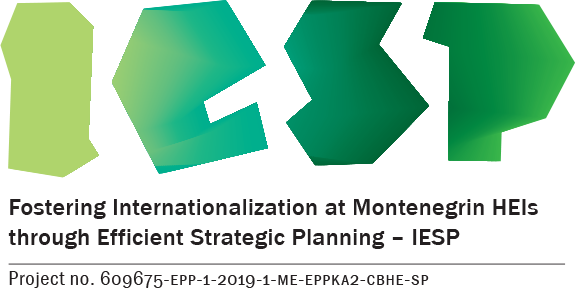
IESP
Podsticanje internacionalizacije na crnogorskim visokoškolskim ustanovama kroz efikasno strateško planiranje (IESP).
Projekat IESP ima za cilj da unaprijedi međunarodnu konkurentnost crnogorskih univerziteta koji su učesnici projekta, prije svega putem obezbjeđivanja najboljeg modela jačanja kapaciteta za različite aspekte internacionalizacije. Svrha realizacije projekta je da prevaziđe nedostatke na koje su, u domenu internacionalizacije visokoškolskih ustanova u Crnoj Gori, ukazali i međunarodni eksperti u svojim izvještajima iz 2018. godine, u okviru Programa Institucionalne evaluacije (EUA IEP).
Specifični ciljevi projekta će biti realizovani kroz nekoliko ključnih zadataka, koji uključuju:
- identifikaciju različitih modela internacionalizacije na partnerskim univerzitetima iz Evropske unije i razvoj smjernica za efikasan model internacionalizacije na univerzitetima u Crnoj Gori;
- razvoj kapaciteta za učešće u procesu internacionalizacije putem obuke osoblja i modernizacije opreme;
- razvoj neophodnih alata za jačanje procesa internacionalizacije koji obuhvataju izradu strategije internacionalizacije sa akcionim planom i pratećim dokumentima, uvođenje nastave na engleskom jeziku na odabranim predmetima na nivou osnovnih i master studija i izradu nastavnih materijala na engleskom jeziku, organizaciju akreditovanih interdisciplinarnih ljetnjih škola na engleskom jeziku, izradu kriterijuma za procjenu kvaliteta procesa internacionalizacije i osnivanje Jezičkog centra za internacionalizaciju na nivou Univerziteta.
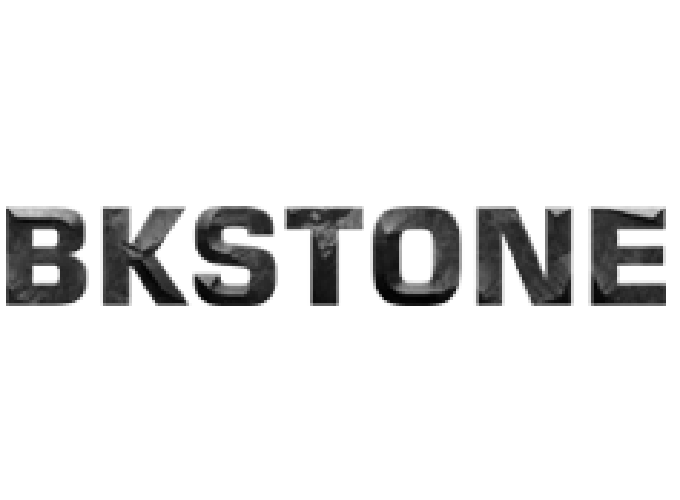
BKSTONE
Platforma za visoko obrazovanje i preduzetništvo za podsticanje, modernizaciju i održivi rast industrije prirodnog kamena na zapadnom Balkanu
Glavni cilj projekta je podsticanje modernizacije i razvoja industrije kamena u partnerskim zemljama zapadnog Balkana i jačanje odnosa između visokog obrazovanja i industrije.
U tu svrhu projektu su dodeljeni različiti specifični ciljevi:
− Benchmark postojećih inicijativa za obuku i uključiti elemente u rezultate projektne obuke;
− Da podrži tehnološku i na praksi zasnovanu inovativnu obuku zasnovanu na pristupu i formatu kurseva;
− Da podstakne učešće zainteresovanih strana u industriji u fazama koncepcije i ispitivanja rezultata;
− Testiranje novih mogućnosti visokog obrazovanja na tercijarnim nivoima stručnog obrazovanja u partnerskim zemljama;
− Davanje doprinosa nacionalnim / regionalnim inovacionim strategijama za specijalizaciju u sektoru prirodnog kamena sa izlaznim rezultatima projekata;
Stvoriti mrežnu platformu Kamenog sektora koja uključuje zainteresovane strane u zemljama programa i partnera;
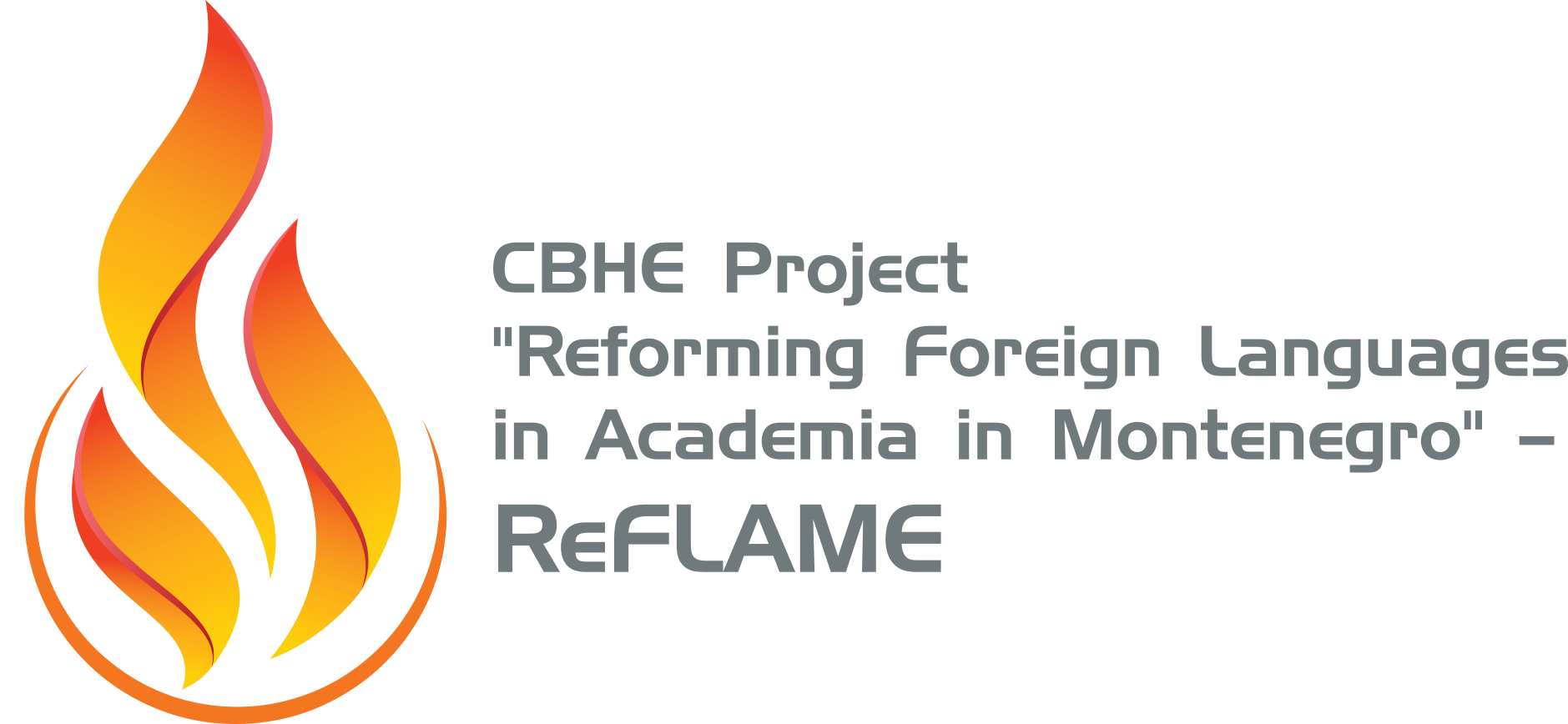
REFLAME
REFORMA STRANIH JEZIKA NA AKADEMSKIH INSTITUCIJAMA U CRNOJ GORI
https://www.reflame.ucg.ac.me/
Projekat ReFlame baviće se reformom nastavnih planova i programa stranih jezika u visokom obrazovanju u Crnoj Gori, a trajaće ukupno tri godine. Koordinator projekta je Filološki fakultet a partneri na projektu su crnogorski Univerzitet Donja Gorica i Univerzitet Mediteran, kao i tri partnerske institucije iz EU – Univerzitet za strance u Peruđi, Univerzitet u Varšavi i Sveučilište u Zagrebu, koji će pružiti ekspertsku podršku iz oblasti nastave jezika struke.
Cilj projekta je jačanje kapaciteta, te međusobne i međunarodne saradnje tri pomenuta crnogorska univerziteta u pogledu ponude moderne i tržišno orijentisane nastave stranih jezika na nematičnim fakultetima, te osnaživanje nastave drugog stranog jezika na svim fakultetima kao odgovor na sve veću potrebu da mladi stručnjaci u svim oblastima poznaju što veći broj stranih jezika.
